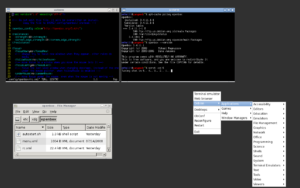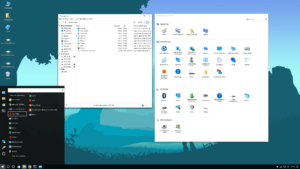When you want to buy a brand new laptop with a latest generation AMD or Intel processor in it, it is just impossible to get one without Windows pre-installed on it. I had first hand experience. It was a shock when I recently thought of buying a new laptop with a latest 11th generation Intel processor, after doing some basic market research from official physical/online stores as well as on popular online retailers, I found that except for customized Laptops from Lenovo that is going to take over 8 weeks to reach me, it is just not possible to get a laptop with latest generation AMD or Intel processor without Windows on it that is ready to ship or immediately available in stores.
In 2021, I did not expect such restrictive market behavior from various OEMs. I thought we have an open market, where people are free to sell what they like however they like provided that they followed the laws of the land. You would be sadden to learn about rampant abuse of power by international and powerful technology companies/corporations world-wide, Windows Tax still being one. Although after a while, we would get laptops without Microsoft Windows for latest chips from AMD or Intel but why cannot they just give us an option not to get Microsoft Windows for your particular unit?
Friendship of Microsoft and popular OEMs is not the only reason
It is quite simple. All the latest generation chips are so new that only the Vendor knows how to manage, optimize and support it for optimal performance. And these vendors are already in touch with an OEM during the development process of these chips with bleeding edge features. So, there is a relationship between OEM and Vendor of these chips i.e. Intel or AMD for the initial releases.
This mutually benefiting exchange during development of drivers and other system software with bleeding edge features in these new chips are to be showcased during a product release. The OS choice is quite obvious as Microsoft Windows is still the king in Desktop OS market, whether it is gaming, software development or general purpose computing like web surfing or Word processing.
It is one of the contributing factor for laptops with latest chips to ship with Microsoft Windows OS. As, it is an obvious choice for Vendors to showcase bleeding-edge features on their chip to be made available to majority of users immediately. It is the market share in Desktop OS that decides the OS.
Installing GNU Linux on your Windows Laptop can be a punishment, also limited hardware warranty is a monopoly trick
The reason why you should not buy a Windows Laptop exclusively supported by a Vendor is support related issues. A Vendor can be a dictatorial entity that determines for how long your device will work or be supported with further updates and timely security patches. For example, if you bought a Laptop in January this year and if your Vendor abruptly decides today that in two years they plan to drop official support for this particular model, you do not really have a lot of options in most jurisdictions across the globe.
Vendors and Microsoft club or collaborate in a trick. When you buy a PC, it comes with a very cheap license of Microsoft Windows software embedded in the chips and pre-installed on the drive it comes with. It is negligible amount paid by OEMs to Microsoft, but when you take the quantity in picture, it is millions of dollars. Essentially, you are paying a tax to Microsoft for something you may or may not use.
Microsoft historically engaged in licensing practices that discouraged the installation of alternate operating systems like GNU/Linux. In 2009, there was an instance where Dell tried to sell computers with GNU/Linux saving 50 USD from the regular list price for the consumers and the Microsoft counter attacked with “no support” that extended to the limited hardware warranty. It is just not acceptable.
There was a series of refund pleas and applications to Microsoft. It went on for a while until, OEMs started refusing refunds quoting, hardware and pre-installed software as a single package. So, if you sought refund for Microsoft Windows, OEM would instead ask you to refund the whole system or hardware. Today, there exists no OEMs that offer refund on bundled Microsoft Windows OS.
Sometimes installing GNU/Linux can be a punishment
The warranty on your latest PC is put altogether by manufacturers and software developers, making changes to one of either i.e. hardware or software means voiding warranty for both, when you have a warranty if the product does not work properly you can ask for a replacement or service depending on your limited hardware warranty clause.
You would be shocked to know that most of the laptops that come with Microsoft Windows bundled might come with a weird clause where they void warranty if you remove pre-installed OS on it. So, as stated above, they offer both the hardware and software as a single piece when it comes to warranty.
The seller or distributor is pretty similar to buyer, because he buys from manufacturers, then he sells it to the buyers at a higher price with some profit. It is not a big profit these days given the competition and maintaining support for various GNU/Linux distribution can be harsh. Some OEMs are like Dell support Ubuntu in some global variants which may not available in all the jurisdictions but Ubuntu is not loved by all. There are people who love Debian, Fedora or Arch, so with a variety of distributions available in GNU/Linux world, it is just not possible for OEMs to offer a technical support service for all or any. So, they choice not to offer any support for it. They would rather go a no OS machine.
Hence, most OEMs tie the warranty to the pre-installed OS which can they throttle, limit, restrict and use to bundle additional software to make more profit in the end of the day. Selling hardware with warranty and no OS or bundled software is not a lucrative business it seems.
It is advised to backup your OEM’s installation of Microsoft Windows that is bundled with your machine with a clone disk tool of your choice
Yes, please avoid formatting disk right away when your new laptop with Windows bundled arrives. As you might need it for warranty purposes later. Even if you install official version of Microsoft Windows from website using the ISO downloaded from Microsoft.com, they might not accept it for hardware warranty purposes.
Vendors are punished on a very small scale after prolific legal battles
Unfortunately, in today’s world, PCs that come with Windows bundled are more cheaper than same computers with a GNU/Linux pre-installed or no OS. The claimed increase in the price has been called the “Windows tax” or “Microsoft tax” claimed by Microsoft as business consequences of broken propaganda by vendors. This means that if some user do not wants Microsoft Windows is only because some vendor are promoting or talking bad about the product.
Chris Clay in 2010 wrote that Dell computers with Ubuntu preinstalled were priced higher than identical systems with Windows preinstalled, even though Ubuntu is free and open source.
In 2011, an Italian consumer watchdog took Microsoft to court over software bundling after it won a pilot case against HP in 2007 and, in 2012, a French buyer won a case against Lenovo.
It is not always the case and as read above now OEMs treat software and hardware as a single unit or piece of electronics for warranty purposes.
According to a 1999 Maximum PC article, Dell did not provide refunds for Windows licenses, interpreting the license agreement to “treat the hardware and software as a single package that must be returned”.
According to a report from TOI dated September 2014, when Mr Masdekar, a programmer at Digital Freedom Foundation in India applied for refund of unused Microsoft Windows license from HP India on a laptop he bought. It took a legal recourse and sent a notice after being refused, which end up in a not so surprising reply from HP stating that, he has an option to drop the request for refund or return the machine/laptop itself. They ending up treating software and hardware as together for warranty purposes. Further, in the report, HP claims it offers a variety of machines with and without OS built-in.
Whether it be Dell or HP, their stand is clear. No more refunds on bundled Microsoft software. The official stand is uniform and lucid across various OEMs too. They claim when OS is not included, it promotes piracy on low cost or budget traditional machines. Majority of the users do not want to install an OS to enjoy the learning curve it offers. Consumers just want it cheaper to install a pirated version of Microsoft Windows.
It is also one of the reasons of failure of GNU/Linux in Desktop world as agreed upon by the father of Linux kernel, Mr Linus as well.
In September 2016, EUCJ ruled that, the sale of a computer equipped with pre-installed software does not in itself constitute an unfair commercial practice within the meaning of Directive 2005/29 when such an offer is not contrary to the requirements of professional diligence and does not distort the economic behaviour of [purchasers].
Things are working out in favor of manufacturers it seems. Thanks to manufacturers like Tuxedo and System76 and others, GNU/Linux users from US, Canada and Europe have access to modern machines with GNU/Linux available as pre-installed one. Sadly, Asians are at the mercy of mainstreams OEMs till date.
Another potential monopoly trick is Microsoft requiring client PCs which carry the Windows 8 logo to enable UEFI Secure Boot and install Microsoft-provided key material. Many modern laptops today come with systems that are UEFI boot only and legacy boot is completely dropped on these platforms. Concerns have been raised that OEMs might ship systems that do not allow users to disable secure boot or install signing keys for alternative operating systems. When that happens, you can stop speculating that access to alternate OS without paying for whitelisted Linux based distributions is inevitable.
Availability of Laptops without Windows bundled in India
When you research market for a traditional laptop without Microsoft Windows bundled with it, you meet the harsh reality of the Laptop PC industry. Market is not fair to a GNU/Linux user here.
Our search criteria was:
- AMD would be Ryzen 5 4500U or better and 11th gen Intel Tiger Lake processors.
- Traditional Laptops with/without touch over 2-in-1
- No Windows bundled, so it should come with GNU/Linux or no OS
Here are some of our experiences with popular OEMs.
Acer
We visited their official e-store and could not find a single laptop as desired. We communicated with their sales team and were refused any laptop without Microsoft Windows OS pre-installed on it.
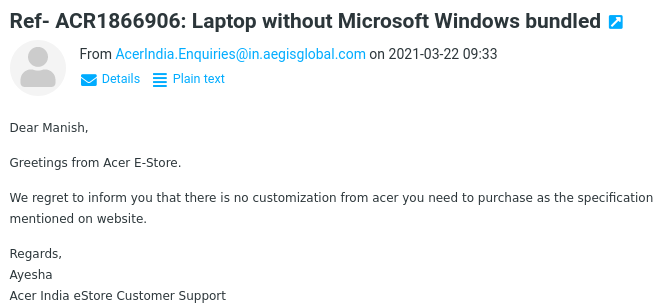
Dell
Same as Acer, no official listing without MS Windows pre-installed. We communicated and were refused. Dell Business store, even refused us latitude models with Ubuntu pre-installed with 10th gen processors as their Business store requires us to be a business to purchase one. We approached them as an average home consumer or student.
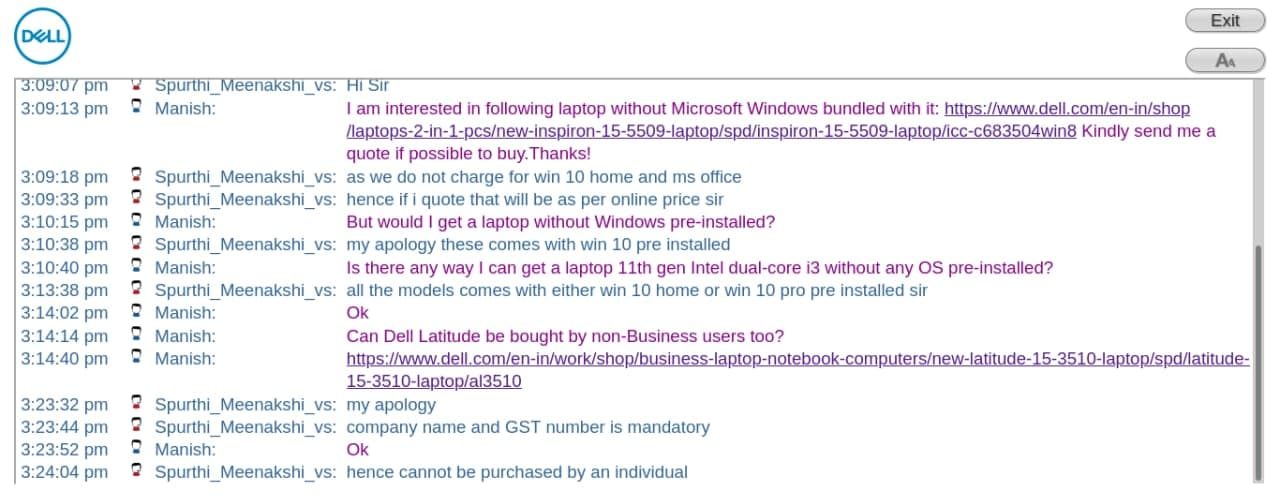
Dell’s customer support, when asked, promised not to void warranty if we used alternate OS like GNU/Linux distribution explicitly.
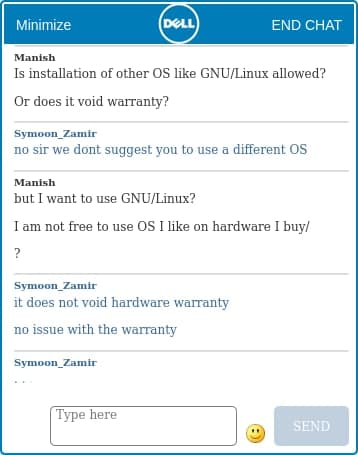
HP
HP India does offer FreeDOS laptops on their official e-store. Most of them are out of the stock and expensive. Out of 11 listed, only 1 is in stock.
We could not find any traditional laptops in stock on the date of publication of this post.
Albeit, we could find a 2-in-one Laptop HP ProBook x360 435 G7 Model with AMD 6-core 4500U processor worth 90,795 INR. We are sure something like Ubuntu would work fine on it. But it is just way to expensive for an average Indian or a student. Just to compare, Apple M1 Macbook Air comes at a price of 83,600 INR with easy student ID verification online.
Kudos to HP India for offering a FreeDOS powerful AMD laptop anyways that is ready to ship unlike the case with Lenovo!
Lenovo
Lenovo is one of the rare companies to offer FreeDOS machines in India single a long time esp. their ThinkPad series. ThinkPad E and L series are pocket friendly and come with the promising build quality and that lovely keyboard too.
At the time of publication, Intel’s 11th gen chips are not available on their official e-store.
Cheapest ThinkPad with FreeDOS for an average user is E15 Gen2 with AMD Ryzen 5 4650U for 56551 INR. Although the average TN panel display is a deal breaker for money but the processor is good for the price.
Although, I find Lenovo to be the perfect OEM to purchase laptops from, there is a big problem. It delivers in more than 12 weeks. What it essentially means is if you want a recent FreeDOS machine from Lenovo, you need to wait over 2 months from the date of order to receive one, if at all.
I personally had a weird experience with Lenovo, I ordered a custom dual-core 11th gen ThinkBook 14 Gen 2 with FreeDOS for a friend, which was cancelled after 40 days stating ‘technical error’ to be the reason. It just did not end there. Lenovo took over 3 weeks more to refund my money. So, at this point, I would not recommend you to buy from Lenovo in India if you seek a FreeDOS machine.
Conclusion
I have nothing to conclude in absence of GNU/Linux oriented laptop manufacturers in India like Tuxedo, System76 etc. Just get what’s best for you regardless of Windows OS bundling. Having read the ruling of EUCJ, I do not hope any better from our jurisdiction and enforcement. I recommend you to backup or clone the OEM’s installation of Windows OS and continue with GNU/Linux. Dell has better specifications to price ratio and do not claim to void your warranty if you use alternate OS on their hardware.
The gist of the matter is, Microsoft has secured a guaranteed income on most modern PCs sold in the market today. You can only register your anger or disapproval by using and promoting GNU/Linux, so it is heard by OEMs once popular enough.
